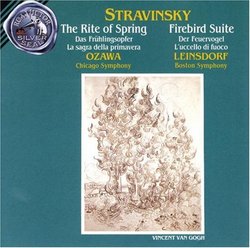| All Artists: Igor Stravinsky, Erich Leinsdorf, Seiji Ozawa, Boston Symphony Orchestra, Chicago Symphony Orchestra Title: Stravinsky: Le sacre du printemps; Fireworks; The Firebird Suite Members Wishing: 0 Total Copies: 0 Label: RCA Release Date: 4/5/1991 Genre: Classical Styles: Ballets & Dances, Ballets, Forms & Genres, Theatrical, Incidental & Program Music, Historical Periods, Modern, 20th, & 21st Century, Symphonies Number of Discs: 1 SwapaCD Credits: 1 UPC: 090266054121 |
Search - Igor Stravinsky, Erich Leinsdorf, Seiji Ozawa :: Stravinsky: Le sacre du printemps; Fireworks; The Firebird Suite
 | Igor Stravinsky, Erich Leinsdorf, Seiji Ozawa Stravinsky: Le sacre du printemps; Fireworks; The Firebird Suite Genre: Classical
|
Larger Image |
CD DetailsSimilarly Requested CDs
|
CD ReviewsA fine recording of Stravinsky's best Jordan Segall | Glendale, CA USA | 08/08/2000 (5 out of 5 stars) "On this recording, Ozawa masterfully conducts the jarring primitivism of the Rite of Spring, a ballet so feverish and violently lush it never fails to evoke enormous emotional responses from anybody I play it for. The Firebird is similarly excellent. The finale, in particular, is infused with every ounce of the raw beauty it deserves. The modulations in volume are handled particularly well, and the tempo seems dead-on. Though by no means the best recording of Stravinsky I've ever heard, this deserves a spot in the collection of any serious modern classical music fan." Best consumed loud and proud Jeffrey Jones | Northern California, USA | 06/01/2007 (5 out of 5 stars) "Stravinsky's Le Sacre du Printemps is one of the greatest artistic conceptions of the 20th century. The raw, primitive feel of the musical material is legendary itself, due in large part to its role in Disney's Fantasia, but in its staged version Le Sacre also managed to completely blow the popular perception of what a ballet was supposed to be. Audiences rioted at its 1913 premiere in Paris, disgusted by its overt eroticism, a similar reaction to that which had condemned Carmen to commercial failure four decades earlier. And similarly to Bizet's masterpiece, it took years for audiences to warm to its forward-looking, ultrarealistic elements, but once they did, its place in the pantheon was cemented permanently. To this day, it remains an unsurpassed landmark in the creative use of extreme dissonance, extended instrumental technique, and ever-shifting, never-settled, barless rhythmical patterns. Ozawa's 1968 performance of Le Sacre with the CSO is fierce, crisp, and extremely clean. The brass players are emotionally wide-ranging and bold, the woodwinds are poignant and technically acute, and the strings compete with both remarkably well on all fronts. The brisk tempi seem not to pose much difficulty for the players, and the urgency of the conception is irresistible. The Firebird is less of an icon than Le Sacre, but it too is a masterwork from the golden period of Stravinsky's life, when his creative instincts were in full harmony with his erudition and his works were as satisfying to the public at large as they were to professors and theoreticians. This performance is of the 1945 suite (which contains more of the original ballet's material than the 1919 suite), though with the Pantomime movement seemingly omitted. The lushness and warmth of Leinsdorf's very Romantic reading provides a nice counterpoint to Ozawa's ferocity in the first half of the disc. The BSO's strings lilt as well as they scythe, and the feeling of this very large orchestra fading to a whisper in unison, then rising out of it, is magical. I simply cannot detect the faults that other reviewers of this CD have pointed out. This is a superb disc and represents a fine value." Technically great, emotionally lacking Alan Majeska | 07/07/2003 (4 out of 5 stars) "This was one of the first Sacres that I listened to while reading from the score. This recording is great for music students, in my opinion, because of the great clarity and rythmic exactness that one has come to expect from the Chicago Symphony. Every line on the score can be virtually "seen" while listening to the music, especially in the winds. The great price and the clarity of the recording make it ideal if you want to really understand the orchestration and other technical aspects of this complex piece. However, I found that these merits can also be interpretive pitfalls. I suppose it depends on what kind of piece you expect from Stravinsky. Do you look at Le Sacre as an outgrowth from the impressionism of Debussy, or as a clean, pre-serialist piece? Judging by the orchestration, rythms, and thematic material, its exact place in music history is rather obscure (though no one would argue that it is not extremely powerful and important!). I suppose that is part of the magic of this piece that is lacking from this recording. I just can't seem to find the character in it that I find in other recordings. You want a monumental piece like this to be treated as such! The other Rite by the same conductor is really much better."
|

 Track Listings (24) - Disc #1
Track Listings (24) - Disc #1